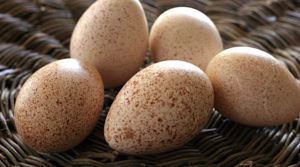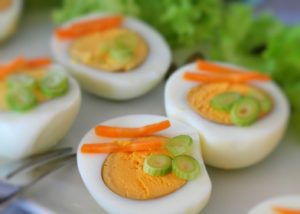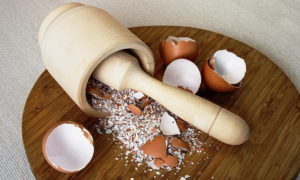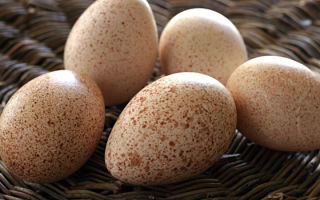Content
- 1 What turkey eggs look like
- 2 The composition and calorie content of turkey eggs
- 3 Can you eat turkey eggs?
- 4 Why are turkey eggs useful?
- 5 Are turkey eggs good for pregnant and lactating women?
- 6 Is it possible for children to have turkey eggs
- 7 How to cook turkey eggs properly
- 8 Application in cosmetology
- 9 How to choose and store turkey eggs
- 10 Harm of turkey eggs and contraindications for use
- 11 Conclusion
- 12 Reviews
In terms of external characteristics, turkey eggs resemble chicken eggs. However, they are rarely seen on the table of the average family due to their high cost and lack of stores. Nevertheless, many are interested in the benefits and harms of turkey eggs, since this scarce delicacy attracts a lot of attention.
What turkey eggs look like
Turkey eggs are slightly larger than chicken eggs and weigh an average of 70–75 grams, the size changes with the age of the bird: they are smaller in young layers. The shell has a white color with a cream shade and many small dark spots, and the older the individual, the brighter the color of the egg. The surface of the shell is porous, but quite dense.

It is extremely rare to find a product in simple supermarkets, mainly, they are sold in specialized farm stores. This is due to the high demand for turkey meat. They usually sell only those eggs that were obtained during the autumn laying, since it is quite difficult to raise chicks in the winter. During the season, poultry produces 15–20 pieces, industrial methods do not greatly increase the scale of production of this product, which is why its high cost is associated.
The composition and calorie content of turkey eggs
Turkey eggs are high in nutrients. The calorie content of the product is 172 kcal per 100 grams. This is beneficial when included in weight loss diets.
Chemical composition of 100 g eggs:
- proteins - 13.69 g;
- fats - 11.87 g;
- carbohydrates - 1.15 g;
- saturated fat - 3.64 g;
- minerals - 0.79 g;
- cholesterol - 932 mg.
The period in which they appeared has a strong influence on the composition of eggs. Those demolished in summer contain more beneficial properties thanks to fresh greens as forage.
In addition to these substances, this product contains a large number of trace elements and vitamins, the benefits of which for the body no one doubts:
- vitamins A, E and calcium, which improve the condition of the skin, bones;
- vitamins B2, B6, stimulating the work of the central nervous system and brain;
- iodine, which normalizes the thyroid gland;
- vitamin D, which increases immunity;
- sodium, which helps to maintain the balance of the acid-base environment;
- iron, which is responsible for oxygenation of tissues and cells.
Can you eat turkey eggs?
Can turkey eggs be eaten? Due to the ideal ratio of nutrients, they can not only be consumed, but also recommended for inclusion in the diet for therapeutic and prophylactic purposes.

There are many different ways to prepare this product:
- boil it;
- fried;
- bake;
- pickle;
- added to various salads.
For some health indicators, for example, with high acidity or gastritis, it is advised to eat raw turkey eggs. In other cases, experts recommend eating them only after heat treatment, since raw they are poorly absorbed by the body and can cause irreparable harm.
Therefore, you should check for cracks and other defects on the surface of the eggs, and wash them thoroughly before use.
Why are turkey eggs useful?
The balanced and rich composition makes turkey eggs an excellent product for enhancing immunity, strengthening nails, hair, and normalizing metabolism. They are also suitable for allergy sufferers who can eat them without harming their condition.

Benefits for the body:
- With the regular use of turkey eggs, there is an improvement in memory, getting rid of insomnia, fatigue, headaches caused by disturbances in the functioning of the nervous system and brain.
- For diseases of the gastrointestinal tract, a diet that includes this useful product is recommended, despite the high cholesterol content.
- Due to its high content of protein, as well as trace elements that contribute to its effective assimilation, turkey eggs are used by athletes to build muscle mass.
- It has a prophylactic effect against atherosclerosis, which is of undoubted benefit for the elderly.
Are turkey eggs good for pregnant and lactating women?
During pregnancy, the female body needs much more iron, since it tends to produce double the amount of blood. That is why it is important for the expectant mother to include iron-rich foods in the diet. This is a turkey egg, moreover, it contains folic acid, which benefits not only pregnant women, but also women planning a pregnancy.
The high content of B vitamins, which also have a positive effect on the functioning of the nervous system, makes the product very useful during pregnancy and breastfeeding due to its property of not causing allergic reactions.
Is it possible for children to have turkey eggs
Due to the fact that turkey eggs are hypoallergenic, they can be safely included in the children's menu. However, we must not forget that raw they will not benefit children, but harm, therefore, they are completely prohibited.
It is worth noting that individual contraindications are possible, so you should consult a pediatrician so as not to harm the baby.
How to cook turkey eggs properly
The use of turkey eggs in cooking is no different from the same chicken eggs, but the former contain much more useful properties. How much turkey eggs to cook depends on their size, on average it takes 10 minutes. There are a huge number of recipes for a delicious product - it all depends on taste preferences.
In addition to the usual methods of cooking and frying, they can be baked directly in the shell due to its strength. Also, some peoples prepare national dishes using this delicacy. For example, in Portugal, they love noodles, the dough for which is made with its addition.
Application in cosmetology
The egg is a useful product for home cosmetology. It can be used to make masks for the face, hair and the whole body, the properties of which are suitable for any skin type, depending on the additional components.
- A mask for dry skin can be obtained by mixing yolks with cream.
- The mask for oily skin is prepared from protein and clay.
- The yolk mask with the addition of olive oil will give the effect of rejuvenation.
- A mixture of yolk and honey tends to soften the skin, and this is an absolute benefit for women.

How to choose and store turkey eggs
When choosing, you need to pay attention to the condition of the shell and refuse to buy if there are cracks and other defects that can harm the quality of the protein and yolk.
On average, the product is stored for up to 25 days in the refrigerator. Due to its loose surface, it tends to absorb various odors, in order to avoid this, it must be stored separately from other products, and can also be placed in a saline solution or lubricated with vegetable oil without fragrances.
Harm of turkey eggs and contraindications for use
The product can cause harm:
- with problems with the absorption of protein by the body;
- with diseases of the kidneys and liver;
- with an individual predisposition to allergies to components;
- with high cholesterol.
In addition, it is advised to refrain from consuming it raw unless there is a medical recommendation.
Conclusion
The composition rich in useful properties is not the only thing that favorably distinguishes a turkey egg from a chicken one; many also note that they are much tastier. Therefore, you must definitely try them to be sure of this. In this case, it is worth remembering the benefits and harms of turkey eggs.

